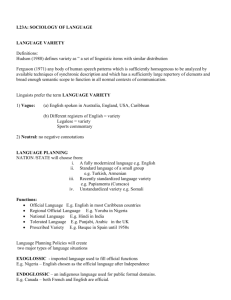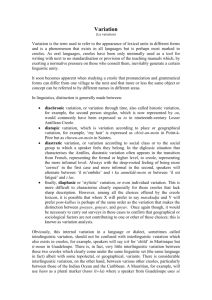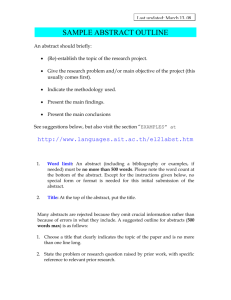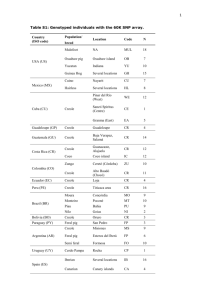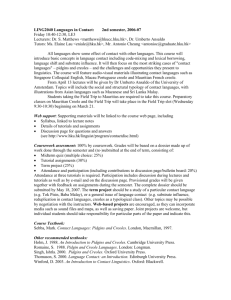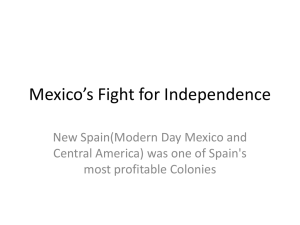lizardi and the european enlightenment: the search for intellectual
advertisement
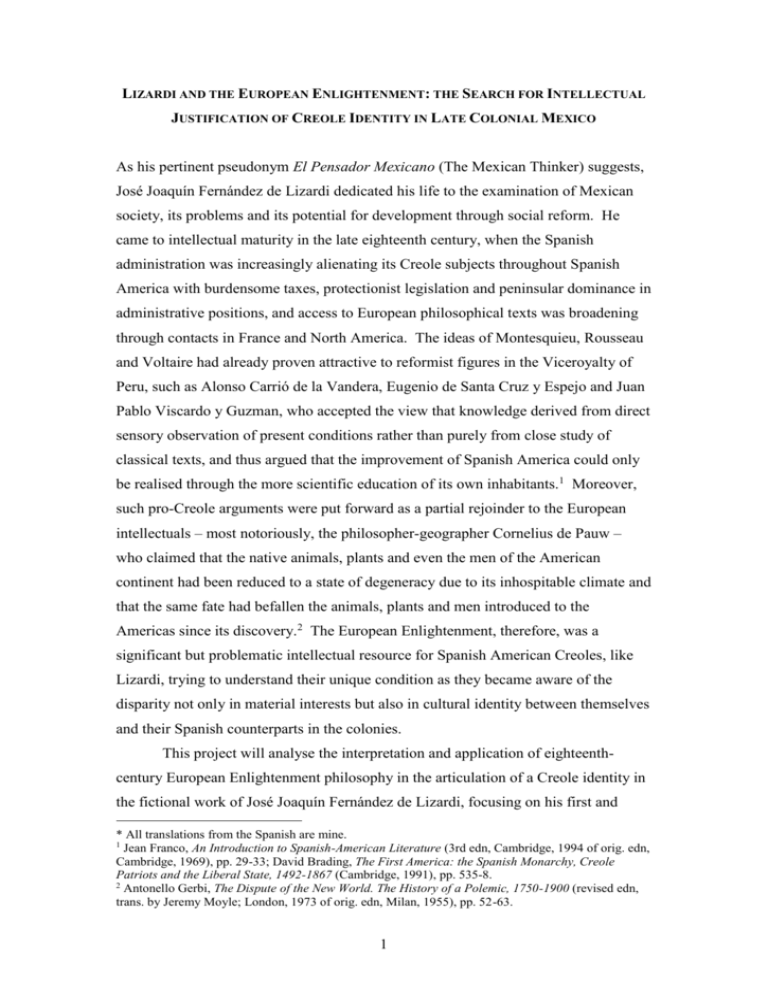
LIZARDI AND THE EUROPEAN ENLIGHTENMENT: THE SEARCH FOR INTELLECTUAL JUSTIFICATION OF CREOLE IDENTITY IN LATE COLONIAL MEXICO As his pertinent pseudonym El Pensador Mexicano (The Mexican Thinker) suggests, José Joaquín Fernández de Lizardi dedicated his life to the examination of Mexican society, its problems and its potential for development through social reform. He came to intellectual maturity in the late eighteenth century, when the Spanish administration was increasingly alienating its Creole subjects throughout Spanish America with burdensome taxes, protectionist legislation and peninsular dominance in administrative positions, and access to European philosophical texts was broadening through contacts in France and North America. The ideas of Montesquieu, Rousseau and Voltaire had already proven attractive to reformist figures in the Viceroyalty of Peru, such as Alonso Carrió de la Vandera, Eugenio de Santa Cruz y Espejo and Juan Pablo Viscardo y Guzman, who accepted the view that knowledge derived from direct sensory observation of present conditions rather than purely from close study of classical texts, and thus argued that the improvement of Spanish America could only be realised through the more scientific education of its own inhabitants.1 Moreover, such pro-Creole arguments were put forward as a partial rejoinder to the European intellectuals – most notoriously, the philosopher-geographer Cornelius de Pauw – who claimed that the native animals, plants and even the men of the American continent had been reduced to a state of degeneracy due to its inhospitable climate and that the same fate had befallen the animals, plants and men introduced to the Americas since its discovery.2 The European Enlightenment, therefore, was a significant but problematic intellectual resource for Spanish American Creoles, like Lizardi, trying to understand their unique condition as they became aware of the disparity not only in material interests but also in cultural identity between themselves and their Spanish counterparts in the colonies. This project will analyse the interpretation and application of eighteenthcentury European Enlightenment philosophy in the articulation of a Creole identity in the fictional work of José Joaquín Fernández de Lizardi, focusing on his first and * All translations from the Spanish are mine. 1 Jean Franco, An Introduction to Spanish-American Literature (3rd edn, Cambridge, 1994 of orig. edn, Cambridge, 1969), pp. 29-33; David Brading, The First America: the Spanish Monarchy, Creole Patriots and the Liberal State, 1492-1867 (Cambridge, 1991), pp. 535-8. 2 Antonello Gerbi, The Dispute of the New World. The History of a Polemic, 1750-1900 (revised edn, trans. by Jeremy Moyle; London, 1973 of orig. edn, Milan, 1955), pp. 52-63. 1 major novel, El Periquillo Sarniento (1816) and his last, written in 1819 but published posthumously, Don Catrín de la Fachenda (1832). Written during a brief interlude from his more prolific journalistic writings as a result of increased censorship of the press, each work narrates the adventures of a young Creole Mexican man stumbling through a life of debauchery, though they differ substantially in style and outcome. Lizardi’s position with regard to Mexico’s violent struggle for political independence is difficult to gauge both from his fiction and non-fiction writings but it seems clear that he considered it a personal mission to disseminate liberal ideas amongst as great a section of the Mexican population as possible in order to further the use of reasoned understanding to improve his homeland’s social and cultural position. Through this study I hope to elucidate the complex cultural relationship that Mexico had with its motherland Spain and Western Europe more generally, seeking a cultivated identity of its own but one that could be validated as a member of the European “club”, during a period in which it was making a troubled transition from colonial to independent status. In the dedication of El Periquillo Sarniento, which is made to his readers, Lizardi presents the dilemma of identity facing his Creole compatriots at this time of political juncture, highlighting, in a passage packed with complex allusions, Mexico’s various social problems, its diverse and divided population and the heritage left, both political and cultural, by its experience of Spanish colonialism. Muy bien sé que descendéis de un ingrato, y que tenéis relaciones de parentesco con los Caínes fratricidas, con los idólatras Nabucos, con las prostitutas Dalilas, con los sacríligos Baltasares, con los malditos Canes, con los traidores Judas, con los pérfidos Sinones, con los Cacos ladrones, con los herejes Arrios, y con una multitud de pícaros y pícaras que han vivido y aún viven en el mismo mundo que nosotros. Sé que acaso seréis, algunos, plebeyos, indios, mulatos, negros, viciosos, tontos y majaderos.3 3 [I know very well that you are descended from an ingrate, that you are related to fratricidal Cains, idolatrous Nebuchadnezzars, prostituting Delilahs, sacriligious Belshazzars, cursed dogs, traitorous Judases, perfidious Sinons, thieving Cacuses, heretical Ariuses, and a multitude of pícaros and pícaras who have lived and who still inhabit the same world as we. I know that perhaps you are, some of you, commoners, Indians, mixed bloods, blacks, fools and nuisances.] José Joaquín Fernández de Lizardi, El Periquillo Sarniento (2nd edn, with prologue by Jefferson Rea Spell; 3 vols, Mexico City, 1966 of orig. edn, Mexico City, 1949), I, p.21. 2 First and foremost, the Creole’s ancestor Spain was an ingrate that sucked everything it could get from its American possessions only to denigrate their cultural worth, to drag its Creole subjects into a fratricidal war rather than grant them a political role in their homeland and to single the New World out for criticism for such sins – religious corruption, prostitution, drunkenness, robbery, deception – as had been equally committed in the Old World many times over.4 Although he mentions that some of his readers would be Indians, blacks and other low status groups, Lizardi knew this was highly unlikely due to the high instance of illiteracy among these sectors of the population. These comments were actually addressed to Creoles, both as a means of demonstrating their difference from European Spaniards by virtue of their association through birthplace with these ethnic groups and as an indicator of the need for Creoles to undertake the education and improvement of the lower class and non-white population so that to be their compatriots would no longer be a negative stigma for Creoles in their own and others eyes. Lizardi simultaneously itemises the ills – war, religious corruption, prostitution, robbery - he wished to purge in order to make his society better and points to a larger problem of Creole identity: how to distance and differentiate themselves from the European heritage that was undeniably a part of their culture, while simultaneously claiming the equality that de Pauwian theories of degeneration denied them. In his analysis, Creoles and Spaniards alike have the same Greco-Roman and Biblical cultural ancestry and the Mexican patria is the only point of difference between them. While proponents of the degeneration theory, however, would use this very difference to support their argument that climatic factors and racial miscegenation were responsible for the decadence of American societies, Lizardi turns this argument on its head to show that Mexico’s social problems had long-standing equivalents, perhaps even their origins, in both ancient and contemporary Europe and, therefore, were not irredeemably linked to the American environment. 4 In the Old Testament Nebuchadnezzar was the Babylonian king who removed the sacred cups from Solomon’s Temple in Jerusalem, which are later profaned by Belshazzar who uses them in the drunken feast he holds before his downfall at the hands of the Persian army; Delilah was the Old Testament lover and betrayer of Samson; Judas betrayed Jesus with a kiss; Sinon was a Greek infiltrator who tricked the Trojans into bringing the giant wooden horse filled with Greek warriors into Troy; Cacus was a fire-breathing, possibly man-eating Greco-Roman monster; Arius was an early Christian theologian of Alexandria, who taught that the Son of God was not eternal. 3 Towards the end of El Periquillo Sarniento, however, Lizardi actually embraces the theory of climatic particularity to demonstrate the inapplicability of universal systems of government, to imply that those with experience of a country’s way of life are best qualified to judge and govern it and to emphasise that differences between one country and another are not innate, fixed qualities on a scale running from superior to inferior but are, rather, merely different and relative to the society, culture and climate in which they operate. While the wayward protagonist, Perico, serves an eight year sentence of military service in Manila, Lizardi has a black man voice the need for recognition of the equal validity of different civilizations around the world since their customs have derived from the peculiarities of their environment. he de concluir con que el mal tratamiento, el rigor y desprecio con que se han visto y se ven los negros, no reconoce otro origen que la altanería de los blancos, y ésta consiste en creerlos inferiores por su naturaleza, lo que como dije, es una vieja e irracional preocupación... es preciso argüirles de necios cuando hacen distinción de las generaciones, sólo porque se diferencian en colores, cuando esta variedad es efecto o del clima, o de los alimentos, o si queréis, de alguna propriedad que la sangre ha adquirido y ha transmitido a tal y tal posteridad por herencia... Luego nada hay que extrañar que varíen tanto las naciones en sus costumbres, cuando son tan diversos sus climas, ritos, usos y gobiernos.5 In the dedication to his novel, Lizardi had intimated that the Creole’s country of birth was the only point of difference between them and the Spanish-born peninsulares but he did so in such a way as to deny that this factor produced any inferiority among the Creoles. With this passage, Lizardi takes a further step towards cultural relativity, arguing that Europeans should not assume that the blacks of Africa or, by inference, 5 [I have to conclude that the mistreatment, severity and contempt that has been and is directed towards the blacks originates in nothing more than the arrogance of the whites, which makes them believe that the blacks are inferior by nature, and this, as I said, is an old-fashioned and irrational concern... It is necessary to argue against these stupidities when they make inequalities among the human generations solely based on differences of colour, since this variation is either an effect of the climate, or the food or, if you’d like, of some property that the blood has acquired and transmitted as an inheritance to posterity... So it is hardly strange that nations vary so much in their customs, when their climates, rites, practices and governments are so diverse.] Lizardi, El Periquillo Sarniento, III, pp. 18-20. 4 the native Americans were inferior by nature simply because their customs differed so substantially from their own. Rather, such differences should be attributed to the influence of environmental necessity and consequent adaptations to society over time and, therefore, should be judged in their own context and not according to the principles that ordered European societies. This argument had important implications for Creole participation in Colonial Mexico’s government and for the defence of Creole identity. The black man states that a society’s customs derived from a combination of climate, rites, practices and governments and that colour or race was not a valid criterion for evaluating a people’s merit. Since the Creoles’ racial equality had been called into question as a consequence of miscegenation throughout colonial history as well as the hiring of Indian women to breastfeed Creole children – an issue to which I shall return below – Lizardi effectively discounts the race issue as a justification for the exclusion of Creole’s from political participation. Moreover, throughout all his fictional and non-fictional work, Lizardi criticises the licentious customs of Creole society but in this passage he implicates the colonial government and the practices it imposed, while he also suggests that if government operated according to local needs by those who knew and understood their environment, in other words by the Creoles themselves, social vices would be much less pronounced. The combination of two strands of Enlightenment theory, that a region or country’s government should operate according to local conditions and that knowledge derived from reason applied to direct sensory observations, could be used to support the Creole desire to play a larger role in the government of their own patria. While the privileged group of peninsulares, occupying most important positions in the colonial government at the end of the eighteenth century, argued that the climate, nutrition and racial mixing in the Americas had made Creoles too immature and dissolute a race to be capable of governing themselves, the latter retorted with the peninsulares’ ignorance of local conditions and selfish desire to benefit themselves rather than the society they were supposed to be working for.6 One of the foremost scholars to have analysed and contextualised Lizardi’s work, Jefferson Rea Spell, has already systematically identified instances in El Periquillo Sarniento where Lizardi criticises Colonial Mexico’s legal, justice, education and medical systems, based on the works of various European authors, as a means of pointing out the governmental 6 Lilian Álvarez de Testa, Ilustración, educación e independencia: Las ideas de José Joaquín Fernández de Lizardi (Mexico City, 1994), pp. 68-70. 5 mismanagement that prevented desirable institutional and social improvements. In an article that also notes Lizardi’s technique of including quotations from Greek, Latin and theological sources to back up his own attitudes, Spell has directly identified the references in the novel to William Buchan, J. Ballexserd, Jean Baptiste Blanchard and Jean Jacques Rousseau with respect to child-rearing and education, to Padre Benito Jerónimo Feijóo on promulgating meritocratic and utilitarian values at the expense of aristocratic ideas about the dishonourable nature of work, to Manuel de Lardizábal on criminal punishments and to Carl Linnaeus, Antoine Lavoisier and Thomas Fuller on medical practices.7 Spell further suggests that Lizardi’s primary purpose in specifically mentioning these authors’ names, over and above proving that he, as a Mexican intellectual, could converse on the same level as Europe’s philosophers, was to provide a kind of bibliographic guide for his Creole readers to follow, since Lizardi was ‘above all the champion of an improved system of education which would enable Mexico to take a place among the enlightened nations of the world.’8 Moreover, Lizardi’s evolving vision of how Mexican society could improve is presented in his fictional work, applying Enlightenment concepts and reforms to the specifics of Mexican reality and experience. Following the example of Bourbon reforms in France and Spain directed towards prioritising agriculture, industry and education, under the advice of enlightened thinkers such as Rousseau, Padre Feijóo and Pedro Rodrígues de Campomames, Lizardi’s fiction included this precept in support of his Creole agenda.9 During the course of his military service, Perico is aboard a ship carrying silver between China and Acapulco that runs into difficulties and the precious cargo has to be thrown overboard if the passengers and crew are to survive. The honourable Colonel who, thus far in the novel, has had the greatest success in reforming the Itching Parrot, takes the opportunity to argue that (contrary to colonialist assumptions) there were resources of much greater value in the Americas than gold and silver: con el sacrificio de ésta compraremos todos nuestra futura existencia. Compraremos la vida con el dinero, y veremos que la vida es el mayor bien del hombre, y el primero a cuya conservación debemos atender; y el dinero, Jefferson Rea Spell, ‘The Intellectual Background of Lizardi as Reflected in El Periquillo Sarniento’, PMLA, 71 (1956), pp. 416-7, 422-3, 427. 8 Ibid. p. 432. 9 Testa, Ilustración, educación e independencia, pp. 10-11; Spell, ‘Intellectual Background’, p. 423. 7 6 los pesos, las onzas de oro, no son más que pedazos de piedra beneficiados, sin los cuales puede vivir el hombre felizmente... no queramos perecer abrazados de nuestros tesoros como el codicioso Creso.10 All the men onboard the ailing ship are invigorated by these words except for one rich businessman, dubbed the egoist, who follows his valuables into the ocean and dies a desperate death, while everyone else, once the ship regains a safe position, manages to recover the lost cargo. In addition to his critique of colonialist mercantile emphasis on precious metals that stifled economic and political development within the colonies themselves, Lizardi thus also allegorises the Rousseau-inspired social contract that ought to exist for Mexico to function properly. The egoist, the only man to act against the common good by refusing to make any sacrifice of his own, perishes as a result of his untempered self-interest, while the rest ultimately lose nothing since they worked together for the best interests of all. To make his point even more emphatically, Lizardi suggests that the egoist had been the ship’s problem all along as the ship recovers immediately after the removal of his possessions, which seemed to be ‘los más pesados que llevaba el buque’.11 Perhaps the egoist, whose obsession with precious metals and total disregard for the wellbeing of his fellow travellers, represents the peninsulares in Mexico and even the Spanish colonial system as a whole. Although Lizardi allows the gold to be retrieved and thus seems to negate the Colonel’s earlier speech, I would argue that the author endorses this turn of events only after the egoist, or Spanish domination, is gone and the rest of the ship’s passengers, symbolically the Creoles, can take charge of Mexican resources for themselves and use them to the good of all rather than the personal profit of one. They have to accept the Colonel’s humanitarian theory before the precious resources can be used appropriately. The pragmatic Lizardi would not deny that gold and silver could be valuable commodities but his central point is that their extraction should not be pursued at the expense of all other enterprises: the prioritisation of precious metals had been in Spain’s best interests, not those of Mexico or its Creole population. [we buy the rest of our lives with this sacrifice and we’ll see that life is the greatest good man has, the first that should be preserved. Money, coins, ounces of gold are nothing but pieces of smelted stone without which man can live happily... Let us not perish embracing our treasures like the greedy Croesus.] Lizardi, El Periquillo Sarniento, II, 331. Croesus was the last king of Lydia whose prodigious wealth could not prevent his downfall at the hands of the Persians. 11 [the heaviest that the boat carried]. Ibid, II, p. 332. 10 7 At the centre of Lizardi’s concept of society as portrayed in El Periquillo Sarniento were the values of work and utility, which needed to be instilled in Mexico’s population through a suitable program of education, ideas which had already gained currency in Europe through the efforts of Enlightenment thinkers.12 Rousseau, for instance, chose for his ideally educated Emile (1762) the profession of carpentry since he considered it to be ‘clean and useful... it calls for skill and industry’ and would thus mould Emile into a socially useful citizen.13 With the advent of North America’s declaration of Independence and the French Revolution, both establishing Republican systems of government, utilitarian attitudes towards public education solidified since it could be used to inform, prepare and condition the population as regards their rights, privileges and obligations as citizens.14 Lizardi shared the enlightened belief that due to the essential rationality of mankind, society could be improved through the education of man, an education that would make the benefits of contributing constructively to society through useful work self-evident and attractive to the individual.15 After failing to succeed in several occupations, including the clergy, medicine, pharmacy and begging, as a result of his steadfast determination to avoid as much work as possible while gaining as much stature as possible, Perico finally contributes eight years of solid, productive service to the army in Manila. His capable instructor, the Colonel, explains the importance in creating good citizens of positive social values towards work that had too long been lacking in Perico’s Mexican life: Has adquirido, desterrado y en tierra ajena, un principalito que no pudiste lograr libre en tu patria; esto, más que fortuna, debes atribuirlo al arreglo de tus costumbres, lo que te enseña que la mejor suerte del hombre es su mejor conducta, y que la mejor patria es aquella donde se dedica a trabajar con hombría de bien.16 Testa, Ilustración, educación e independencia, p. 42; Spell, ‘Intellectual Background’, p. 423. Jean Jacques Rousseau, Emile (reprint, trans. by Barbara Foxley, intro. by André Boutet de Monvel; London and New York, 1957 of orig. edn, London and New York, 1911), p. 163. 14 Josefina Vázquez de Knauth, Nacionalismo y educación en México (Mexico City, 1970), p. 9. 15 Ibid. pp. 21-2; Testa, Ilustración, educación e independencia, pp. 124-6, 159; Nancy Vogeley, Lizardi and the Birth of the Novel in Spanish America (Gainesville, 2001), pp. 112-5. 16 [Exiled in a foreign land, you have acquired a little principal that you could not set free in your own country, and you should attribute this more to your decent behaviour than to fortune. It should teach you that good conduct makes a man’s fate better and that the best fatherland is the one where honourable manhood is dedicated to work.] Lizardi, El Periquillo Sarniento, III, p. 28. 12 13 8 Unfortunately, during his voyage back to Mexico, Perico quickly abandons his work ethic, dreams of buying a landed estate with the Colonel’s inheritance money and becoming the viceroy, pretends to be a Count when he is shipwrecked on the socially utopian Pacific island of Sancheofú, fritters the inheritance away on with ostentatiously luxuriant living and ends up joining a group of bandits. Lizardi thus condemns the predominant values in colonial Mexico that associated honour and prestige with titles, land ownership and luxuriant lifestyles at the expense of a more modest work ethic, and uses Perico’s transformations to demonstrate both the Creole’s promise should these social values be reversed and the institutional constraints that were preventing the fulfilment of this promise. By way of reiterating this message, Lizardi includes an exchange in which a complete outsider to Mexican society points out the nonsensical nature of a value system that prioritised lineage, ostentation and prestige over utility, merit and social contributions. After the leader of Sancheofú – in contrast to colonial Mexico a nonEuropean, secular, peaceful society that functions perfectly since every inhabitant serves his own purpose – exposes all Perico’s supposed erudition and professional experience as a superficial gloss, he charges his compatriot Limahotón with the task of teaching the Mexican some trade that will benefit their land. Ignoring the lessons recently learned from the Colonel in Manila, Perico, as work-shy as ever, tries to convince Limahotón that he is a Count and therefore exempt from labour but the islander has trouble with the concept: “Yo no entiendo ésto”, decía el chino. “¿Conque tu padre batió castillos, rindió ciudades, derrotó ejércitos, en una palabra, afianzó la corona en las cabezas de sus señores, y acaso perdería la vida en alguna refriega de esas, y tú, sólo porque fuiste hijo de aquel valiente y leal caballero, te hallaste en estado de ser Conde y rico de la noche a la mañana, sin haber probado los rigores de la campaña, y sin saber qué cosa son los afanes del gabinete? A la verdad, en tu tierra deben ser los nobles más comunes que en la mía. Pero dime: estos nobles que nacen y no se hacen, ¿en qué se ejercitan en tu país? Supuesto que no sirven ni en la campaña ni en los bufetes de los príncipes, ni son útiles ni en la paz ni en la guerra, ni saben trabajar con la pluma ni con la 9 espada, ¿qué hacen, dime? ¿En qué se entretienen? ¿En qué se ocupan? ¿Qué provecho saca de ellos el rey o la república?” “¿Qué han de hacer?...” dije yo, imbuído en mis flojas ideas. “Tratan de divertirse, de pasearse, y cuando más trabajan en que se no menoscabe su caudal.”17 While Limahotón, a citizen of an ordered and productive society, thus approaches the issue with rational, reasoned critique, Perico unthinkingly continues to cherish the very precepts of his society that have led him into destitution, prison and exile, since he is both the product and partial cause of colonial Mexico’s problems. Lizardi primarily drew from Rousseau’s advice on holistic education as the best means of reforming the social attitudes that were responsible for behaviour like Perico’s. Like the Genevan’s Emile, both El Periquillo Sarniento and Lizardi’s second novel La Quijotita y su prima (1818) argue for maternal breastfeeding (largely to avoid the pernicious influence of malnourished or immoral wetnurses), physical activity, bodily freedom and exposure to discomfort in early childhood, basic guidance with respect to sex and marriage, schooling under a capable master motivated by non-material motives in a spacious, light environment without the use of corporal punishment, and teaching through demonstration and experimentation rather than through lecturing and rote learning. Lizardi’s discussion of breastfeeding, however, is adapted to suit the Mexican, and more generally Latin American, Creole context, since he also addresses the issue of the wetnurses’ race. While Rousseau was primarily concerned that wetnurses’ bad habits and the lack of close maternal contact would prevent children from developing the ‘natural feeling’ of ‘mutual affection’18 that was necessary for productive citizenship, Lizardi specifically refers to the [“I do not understand,” said the Chinaman; “your father battered down castles, took cities, defeated armies, in one word, steadied the crown on the heads of his lords, and perhaps lost his life in one of those frays. And you, simply because you were born a son of that valiant, loyal gentleman, get to be a Count and rich, without having even tasted the rigors of the campaign, without knowing what the endeavours of the Cabinet are? Nobles must be more common in your land than they are in mine. But tell me, what do these nobles, born and not self-made, do in your country? If they serve neither on the battlefield nor in the offices of their princes, if they are useful neither in peace nor in war, if they do not know how to work with pen or sword: What do they do? How do they amuse themselves? How do they occupy themselves? What benefit does the King or State get out of them?” “What do they do?” I said, deep in my idle thoughts. “They do nothing but amuse themselves, they promenade, and at most they work at whatever will not exhaust their fortune”. Lizardi, El Periquillo Sarniento, III, pp. 60-1. 18 Rousseau, Emile, p. 13. 17 10 damaging effects on Creole children of being fed by Indian women in El Periquillo Sarniento: es una cosa que escandaliza a la Naturaleza que una madre racional haga lo que no hace una burra, una gata, una perra, ni nunguna hembra puramente animal y destituída de razón... ¿Y el hombre dotado de razón ha de atropellar las leyes de la Naturaleza, y abandonar a sus hijos en los brazos alquilados de cualquier india, negra o blanca, sana o enferma, de buenas o depravadas costumbres, puesto que en teniendo leche19 In addition to concerns about the physical health and moral character of the breastfeeding women, which are borne out when Perico acquires a sickly disposition and immoral attitudes, Lizardi seems to fear that white Creole children could be racially contaminated through such contact with Indian women or, more likely, bearing in mind his rejection of race-based theories of identity discussed above, that European arguments assigning Creole inferiority could be bolstered with this “evidence”. De Pauwian theories linking American degeneracy to climatic factors could be used by peninsulares and Spanish officials to construct a picture of Creole inferiority, which the former could argue, was due to the latter’s contact since birth with local surroundings, to the climate and to their Indian nurses.20 For Lizardi, the potential stain that Indian breastfeeding could have on the Creole’s identity in his own and others’ eyes made the necessity of reforming Creole mothers’ attitudes even more pressing than Rousseau’s manual for education suggested. Lizardi was more explicitly concerned than Rousseau with social reforms that would be dedicated to creating a society in which this holistic style of education would be at least possible, let alone effective. Rousseau repeatedly emphasised the withdrawal of his Emile from modern, urban society to better equip him with the tools for resisting its vices in the future but, while Lizardi accepted Rousseau’s proposition that society corrupts man, he also believed (more akin to Voltaire than Rousseau) that man was naturally inclined towards vice and, thus, the most effective means of 19 [it is an outrage to Nature that a rational mother should do what a donkey, a cat, a bitch, or any female creature destitute of reason does not do... Yet man, endowed with reason, will trample upon the laws of Nature and abandon his children to the hired arms of any Indian woman, dark or light, healthy or sick, of good or depraved habits, simply because she gives milk]. Lizardi, El Periquillo Sarniento, I, p. 39. 20 Gerbi, Dispute of the New World, p. 183. 11 helping man to avoid vice was to purge society of it first. For instance, in La Quijotita y su prima, after the socialite Eufrosina violently beats her “quixotic” daughter Pomposa for smoking, the novel’s pedagogic figure Colonel Linarte, who educates his own daughter Pudenciana in total contrast to his niece Pomposa’s upbringing, counsels his sister-in-law Eufrosina on the hypocrisy of the punishment. Linarte points out that it was perfectly natural for the girl to emulate a custom that she observed her parents practicing in very positive contexts, without ever having been told why it was inappropriate for her to do so. Moreover, the arbitrary nature of the punishment handed out would merely breed ignorance and resentment in the child, a problem that Lizardi links to Mexican society as a whole when Linarte compares Eufrosina’s action to arbitrary political rule: ¿Quién mejor que los reyes y sus vicegerentes pudieran mandar cualquiera cosa, sin tener que decir más sino hágase esto porque yo lo mando?21 With this statement Lizardi also seems to question the nature of political authority in colonial Mexico and suggests that if Creoles were not to be allowed proper participation in the government of their own country they should at least be allowed to criticise the inadequacy of those who were. Indeed, La Quijotita y su prima as a whole can be read as an allegorical defence of Creole identity. It is striking and, I think, very significant that Lizardi’s ideally-educated woman Pudenciana is much more capable, rational and even independent than Rousseau’s Sophy in Emile, since Lizardi closely follows the latter work in terms of its structure and pedagogical theory, even reproducing an extended passage from the Genevan’s novel that advises parents against giving in to a child’s every demand.22 For instance, while Pudenciana develops a reasoned understanding of religious principles and has a practical, profitable skill repairing watches in addition to the array of traditional females talent such as embroidery and playing the piano, Sophy is trained only in these latter endeavours and relies not on reason to choose virtue over vice but rather the principle of modesty that her feminine nature 21 [Would it be better if the kings and their deputies were able to order whatever they wanted without having to say more than do this because I order it?] José Joaquín Fernández de Lizardi, La Quijotita y su prima (intro. by María del Carmen Ruíz Castañeda; Mexico City, 1967), p. 42. 22 Ibid. from p. 88. 12 and education has instilled in her.23 As a consequence of this pronounced difference, I am inclined to agree with Nancy Vogeley’s critical perspective that Lizardi used the subordinate status of women in general to allegorise the colonial status of Creole men.24 Vogeley further argues that Lizardi’s central aim was to teach Mexico’s Creole population to transcend their dependent, inferiorised position as colonial subjects and, while her thesis tends to overlook contradictions and ambiguities arising from Lizardi’s uncertainty with regard to the violent struggle for independence, I think Vogeley is correct to identity the allegorisation of Creole subordination, as well as the means for Creole advancement, through his female characters and their respective fates in La Quijotita. Pomposa and Eufrosina’s decent into poverty, drunkenness and prostitution after the former is lured into marriage with a con-artist posing as a Spanish Marquis is an indictment of colonial society’s superficial, aristocratic values, while Pudenciana’s intellectual and moral superiority and her achievement of familial harmony with the aptly named Modesto represents the potential for Creole development through education and honest work once free from the stigma of colonial inferiority. Rather than indicating any kind of feminism within Lizardi’s thought, his insistence on the improvability of women was defined completely in terms of their relationships with men: their dependence upon men for this very improvement and the benefits for men and, consequently, for society, that it would bring. Speaking through Linarte, Lizardi explicitly blames the weakness, inaction and irresponsibility of Eufrosina’s husband, Dionisio, for the profligacy, arrogance and eventual demise of the latter’s wife and daughter: según la experiencia que tengo, las mujeres no serían tan fatuas, vanidosas ni locas si siempre les tocasen por maridos hombres prudentes y sensatos, que supiesen hacerlas entrar por el camino justo y razonable.25 In stark contrast to Dionisio, Linarte takes authoritative yet kindly control of his household, ensuring that his wife and daughter are provided for, that they rationally 23 Lizardi, La Quijotita, pp. 20-1, 100-1; Rousseau, Emile, pp. 323, 328-333. Vogeley, Lizardi and the Birth of the Novel, p. 25. 25 [in my experience, women would not be so fatuous, vain or irrational if they always chose husbands that were wise and sensible men who knew how to make them follow the reasonable and just path]. Lizardi, La Quijotita, p. 45. 24 13 control their social and moral behaviour and that they obey his rule, not out of blind fear or love, but because they understand the reason in his rules. Furthermore, Lizardi clarifies at a very early stage in the novel that such careful treatment of women is not designed merely to please the fairer sex but to give them the necessary qualities to, nurture, cultivate and support their men and, thus, society. Linarte tries in vain to advise Eufrosina that it was woman’s role ser la delicia de los hombres, el depósito de los sabios, el abrigo de los generales, el trono de los reyes, el asilo de los justos y el altar primero de los santos, pues todo esto es la madre a cuyos pechos y en cuyos brazos se crían los sabios, los reyes, los justos y los santos.26 So, it is clear that Lizardi believed only men should comprise the public, political community that organised and controlled Mexican society in the late colonial and early independence era but the education of Creole women, like Eufrosina, Pomposa, Pudenciana and Matilde (Linarte’s wife), with respect to rationality, modesty, respect, obedience and domestic economy, would be crucial to the elevation of Creole men to this public, political community that had hitherto been dominated by Spanish-born elites as a result of the colonial dynamic. Or, in Vogeley’s concise words: The Mexican woman... could help the Mexican male declare his independence from his Spanish parents (la madre patria) by encouraging him to take on family status and thereby demonstrate his maturity... interrupting the colonial cycle and educating Mexican youth.27 Linarte’s paternalistic, reasoned, and just control over his wife and daughter act as a model for Creole men to follow in their family life. He ensures that Pudenciana will, after choosing a sensible husband who adheres to Linarte’s model, produce socially useful, well-educated and responsible children that will help Mexican society to prosper. While Lizardi’s advocacy of such an endeavour does not in itself 26 [to be the delight of men, the repository of the wise, the shelter of generals, the throne of kings, the sanctuary of the just and the first altar of the saints; for all this is what makes her the mother, in whose arms and at whose breast the wise men, the kings, the just and the saints grow.] Ibid. p. 28. 27 Vogeley, Lizardi and the Birth of the Novel, p. 201. 14 demonstrate his commitment to political independence, as Vogeley seems to suggest, it does encourage Creole men to reject the stigma of colonial inferiority and achieve a kind of metaphorical independence through the practice of paternalistic, rational and just authority over their families, which would prove their ability to participate in the government of society. I would further argue that the considerably more independent nature of Lizardi’s ideal female student, Pudenciana, as compared to Rousseau’s Sophy, highlights his allegorisation of the Creoles’ colonial situation in the female characters and thus adds an extra layer of meaning to his Rousseau-inspired programme for social reform through education; the educational-social reform would be fundamental to the Creoles’ ability to transcend the stigma of colonial inferiority. A further key diversion in Lizardi’s thought on education from that of Rousseau, shedding light on the former’s concern for the Creole’s position in Mexican society, surrounds the issues of language, reading and writing. While Rousseau proposed that teaching a child to read should be postponed as long as possible, until he discovered its utility for himself, Lizardi includes literacy among the first lessons that Pudenciana and Perico should learn properly.28 More significantly, through Perico’s multiple misadventures in El Periquillo Sarniento – indeed, through his very nickname, the Itching Parrot – showing that superficial learning, pedantry or loquacity was no substitute for a true understanding of knowledge, Lizardi repeatedly exposes the hypocrisy of colonial institutions that denied Creoles participation on the basis of superficial prejudice rather than merit. As Nancy Vogeley has argued, this message is embedded within the very structure of the novel, in which Lizardi’s lengthy moral digressions intersperse the more entertaining, often vulgar expressions and actions of his protagonists, thus achieving a juxtaposition of youth and maturity, oral and written traditions, pleasurable reading and rational reflection to create a middle (Creole) way between the pedantry of the elite classes and the illiteracy of the masses.29 For Lizardi was not merely using the inherited Spanish language of the colonial order; rather, he adapted it to the experience and needs of Creole Mexican reality at a time of profound uncertainty about their future. In Vogeley’s own words: 28 Rousseau, Emile, p. 77; Lizardi, La Quijotita, pp. 18, 56-7; Lizardi, El Periquillo Sarniento, I, pp. 49-52. 29 Vogeley, Lizardi and the Birth of the Novel, pp. 176-84. 15 For Lizardi mastery of the written language meant overcoming an aspect of colonial inferiority; it meant acquiring the body of knowledge behind the erudite terms; and it meant using language to help rather than to harm one’s fellows.30 While enlightened learning and liberal freedoms may have been a complete program for human improvement for many of the European philosophers whose work provided great inspiration for him, Lizardi could not reconcile himself with their secularism as a result, not only of the need to circumvent censorship, but also of his own faith and of the central place that religious expression held within the Creole identity. Eighteenth century Creole patriots, for instance, portrayed the sixteenth century miraculous appearance of the Virgin of Guadalupe as divine sponsorship of a distinct Mexican Church whose foundation was independent from Spanish influence, while her cult provided a major area of common ground between Creoles, Indians, mestizos and castas, otherwise disparate sectors of the Mexican-born population.31 In this respect it is significant that Lizardi encountered Rousseau’s ideas through the synopses, interpretations and partial refutations of the latter’s work done by the French Jesuit Jean Baptiste Blanchard and the Spanish Jesuit Feijóo.32 While Lizardi accepts that man has become corrupt in social and political affairs he does not accept what is perhaps the most compelling argument for modern readers in Rousseau’s Emile: that man should return to a natural religion based on reasoned spirituality and tolerance of others, since religious and dogmatic divisions were derived from human authority, which was often flawed as the observation of human society had proven.33 The incongruence between Enlightenment philosophy and religious authority that troubled Lizardi is clearly foregrounded in his last novel Don Catrín de la Fachenda. While his foppish protagonist Catrín is attending a dinner party at a noble’s house the other guests start to discuss the Catholic religion and the pernicious Nancy Vogeley, ‘Defining the “Colonial Reader”: El Periquillo Sarniento’, PMLA, 102:5 (1987), p. 791. 31 Jacques Lafaye, Quetzalcoatl and Guadalupe: The Formation of Mexican National Consciousness, 1531-1813 (reprint, trans. by Benjamin Keen, with foreword by Octavio Paz; Chicago and London, 1987, of orig. edn, Chicago and London, 1974), pp. 88-98; Brading, The First America, pp. 348-9, 35761. 32 Testa, Ilustración, educación e independencia, pp. 51-4; Jefferson Rea Spell, ‘Rousseau’s 1750 Discours in Spain and Mexico’ in Jefferson Rea Spell (ed.), Bridging the Gap: Articles on Mexican Literature (Mexico City, 1971), pp. 73-4. 33 Rousseau, Emile, p. 223, 261, 278. 30 16 effects of modern ideas, and Catrín observes to himself in a rather tongue-in-cheek fashion: Todos los concurrentes eran fanáticos; no había espíritu más fuerte que el mío. Hablaron con mucho respeto del dogma, de la revelación y tradición, y al fin de todo remataron diciendo que la ilustración de este siglo consiste en el libertinaje, cuyas consecuencias son la corrupción de las costumbres y el error en las verdades más inconcusas.34 While Catrín is undoubtedly a ridiculous figure, whose inflated ego, selfishness and misguided philosophy ultimately lead him to a miserable death, in passages such as these Lizardi seems simultaneously to mock those of the other extreme who reject all the potentially positive influences of modern philosophy. Just as Catrín has mistakenly devoted his ‘espíritu más fuerte’ to the pursuit of self-interest at any cost, the ‘fanáticos’ who reject all forms of enlightenment to preserve tradition are locked in the colonial system of unyielding privilege. Nicolas Shumway has made a convincing analysis of the contradictory impulses in Don Catrín as evidence of a ‘moral fissure’ in Lizardi’s thought with respect to the appropriate balance of modern ideas and traditional authority in Mexico’s evolving political environment in 1818-19 when he wrote this novel.35 Catrín himself acts as a kind of figurehead for the relativism implied by enlightenment ideas and liberal freedoms and, while he and his cohorts generally use them to ill effect, their arguments in favour of them frequently overpower those of moralising opponents from traditional positions of authority like the clergy, nobility and military. Lizardi has effectively created a character who ‘not only questions the existence of absolute truth; he manifests a remarkable indifference to its existence’ and ‘the novel is ultimately a dialogue between Lizardi and his creation, a dialogue in which the creation occasionally seems to out-argue his creator’.36 Thus, while Lizardi 34 [All those present were fanatics; there was no stronger spirit than mine. They spoke with much respect of dogma, revelation and tradition and finally they ended up saying that this century’s Enlightenment amounted to libertinage, whose consequences were the corruption of customs and the denial of the most incontrovertible truths]. José Joaquín Fernández de Lizardi, Don Catrín de la Fachenda, y Noches tristes y día alegre (with prologue by Jefferson Rea Spell; Mexico City, 1970 of orig. edn, Mexico City, 1959), pp. 73-4. 35 Nicolas Shumway, ‘Don Catrín de la Fachenda and Lizardi’s Crisis of Moral Authority’, Revista de Estudios Hispánicos, 30:3 (1996), p. 365. 36 Ibid, pp. 370-2. 17 seems to agree that the hierarchical system of privileged authority that existed under the colonial system, and that Enlightenment theories helped to critique, could not continue if the Creole population were to participate in Mexico’s future governments, he was reluctant to accept the full implications of these theories, since they would undermine other aspects of Creole legitimation such as the Virgin of Guadalupe’s patronage of the uniquely Mexican Church. Shumway’s assertion that these doubts and conflicts were not present in Lizardi’s earlier fiction, however, is rather misguided for the arguments presented in defence of “immoral” actions by, for instance, the mulatto criminal Aguilito in El Periquillo Sarniento are often as compelling as those of the catrines. In both novels, the authoritarian characters and sermons ultimately fail to reform the wayward youths but, whereas Perico eventually learns the value of a modest, socially responsible and productive life through his own experience when he witnesses the deaths of his partners-in-crime, even bitter experience fails to make an impact on Catrín, who himself suffers the amputation of a leg, a lonely disease and a painful death, upon which he remains unrepentant. Whereas El Periquillo Sarniento includes a detailed plan for educational, moral and social reform, the only specifics that appear in Don Catrín de la Fachenda are those that would help budding miscreants, such as the list of Machiavellian maxims, and the moral message is left to their opponents’ ineffectual sermons and, of course, Catrín’s unhappy ending. Lilian Álvarez de Testa is, I think, justified in arguing that this imbalance reflects Lizardi’s growing uncertainty about the optimistic view of many Enlightenment thinkers that by merely experiencing the usefulness of moral behaviour people and society would improve. The main impetus guiding the novel was, as Testa suggests, cuestionar el principio mismo con que se venía discerniendo entre el Bien y el Mal: la utilidad. Lizardi sabe que el valor de la verdad y la solidaridad no puede fundarse en el utilitarismo ya que para los catrines los principios de Maquiavelo son muy útiles.37 37 [to question the principle itself which had come to discern between Good and Evil: utility. Lizardi knew that the value of truth and solidarity could not be based on utilitarianism since, for the catrines, the principles of Macquiavelli are very useful.] Testa, Ilustración, educación e independencia, p. 238. 18 I would further add that this idea, questioning Enlightenment optimism with respect to the relationship between experience, utility and human improvability, coupled with a style of writing very different from Lizardi’s other novels, closely resembles the argument and style of Voltaire’s Candide (1758). Although we are lacking documentary confirmation that Lizardi read this work before writing Don Catrín de la Fachenda, some seven or eight years later, Lizardi made several approving references towards Voltaire in his periodical, El Correo Semanario de México (1826-7), which criticised violent religious persecution, Papal interference in State affairs, the rigid hierarchical organisation of the Catholic Church and the latter’s opposition to social reforms. In the third issue (6 December 1826), Lizardi praises Voltaire as one of the great ‘apóstles de la tolerancia’, he calls for an end to the ban on Voltaire’s work in the ninth (17 January 1827), and reproduces some verses bearing a thoroughly relativistic message attributed to the Frenchman in the twentyfirst and second.38 Although Lizardi was rather more radical in his later years, or at least more open about it, his attraction to liberal principles of tolerance, relativism and civil freedom is evident in the “moral fissure” that Shumway has identified in Don Catrín de la Fachenda, which often resembles Voltaire’s Candide in tone, structure and message. The rather too obvious allegorical names (the title roughly translates as Sir Toff of the Show-Offs) that signpost each character’s personality and fate create a farcical tone and, added to the frequent use of sarcasm and irony on both sides of the argument, the novel seems to mock the naive do-gooders equally as well as the conceited rogues. Moreover, Voltaire’s conclusion at the end of Candide’s tempestuous, and ultimately futile, search for happiness, that work, the profitable use of an individual’s talents, was ‘the only way to make life bearable’, seems to mirror the only real failing for which Lizardi holds Catrín himself responsible.39 After Catrín’s death, Lizardi has a medical assistant, actually named Cándido, conclude the narrative with the first uncontested judgement within the story: El, a título de bien nacido, quiso aparentar decencia y proporciones que no tenía ni pudo jamás lograr, porque era acérrimo enemigo del trabajo. La 38 José Joaquín Fernández de Lizardi, Obras, VI. Periódicos: Correo Semanario de México (ed. by María Rosa Palazón Mayoral; México City, 1975), pp. 53, 148-9, 334-6, 346-50. 39 Voltaire, Candide. Or Optimism (reprint, trans. by John Butt; Harmondsworth, 1980, of orig. edn, Harmondsworth, 1947), p. 144. 19 holganzanería le redujo a la última miseria, y esto le prostituyó a cometer los crímenes más vergonzosos.40 Perhaps Lizardi chose this as his last fictional message to reassure his Creole readers that, in spite of many uncertainties, a modest social station, which many of them occupied as doctors, shopkeepers, artisans and other middling occupations, was nothing to be ashamed of, indeed the proper goal to aim for as a Creole. While his advice to pursue nothing more than an honest day’s work implicitly criticised those at the top of colonial Mexico’s hierarchical structure, whether Creole or Spanish, for promoting a set of values that prioritised exclusivity, luxury and prestige, Lizardi simultaneously encouraged Creoles to abandon these values in favour of ones that actually meant they could be included in and contribute to Mexico’s social, economic and cultural life in a positive way, even if the colonial system still excluded them politically. A statement made in the aftermath of Mexico’s Independence by one of the most vocal Creole patriots in Mexico, Fray Servando Teresa de Mier, indicates the importance that Enlightenment ideas had for the cultivation of a positive Creole identity and the political implications of this process: a nosotros no sólo se nos prohibió imprimir libros en que se tratase de cosas de Indias sin ser aprobados en España, sino también llevar libros impresos de ésta que tratasen de cosas de Indias... por la razón expresa de que S.M. no consideraba conveniente se hiciese general la ilustración en las Américas.41 Although Lizardi took a much less radical political stance with respect to independence than Mier, he agreed that the intended intellectual isolation and underdevelopment imposed to ensure that colonial Mexico remained colonial was a great injustice to the Creole population. As this analysis of Lizardi’s fictional work 40 [Due to his title of good birth, he wanted to show off the decent lifestyle and means that he did not and never could have because he was a staunch enemy of work. Laziness reduced him to the ultimate misery, and so he prostituted himself to commit the most shameful crimes.] Lizardi, Don Catrín, p. 108. 41 [not only were we prohibited from printing our own books on the subject of the Indies without being approved in Spain, but also from importing books about the Indies printed in Spain... His majesty did not consider it convenient to spread Enlightenment through the Americas] Cited in Testa, Ilustración, educación e independencia, pp. 56-7. 20 has shown, this isolation was neither complete nor effective, since Mexico’s selfstyled Thinker drew heavily upon the ideas of several European philosophers and reformers to castigate Mexico’s social ills, to argue for greater equality and inclusion of Creoles in the government of their country, to formulate a reform program for its improvement and to demonstrate the worthiness of his and his country’s place in a trans-Atlantic intellectual exchange. For Lizardi did not merely reiterate the ideas of Rousseau, Voltaire and others; he adapted some to suit the Mexican context, he fused some with his own ideas and agendas and he disputed or ignored many others that were not useful for his purpose. In doing so, Lizardi tried to elevate the domestic and international image of his country and its Creole population, a project that would occupy a central place in many subsequent literary endeavours during the national era. 21


